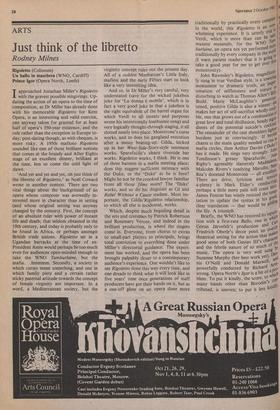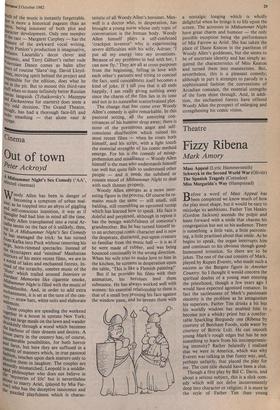ARTS
Just think of the libretto
Rodney Milnes
Rigoletto (Coliseum)
Iapproached Jonathan Miller's Rigoletto with the gravest possible misgivings. Up- dating the action of an opera to the time of composition, as Dr Miller has already done with his memorable Rigoletto for Kent Opera, is an interesting and valid exercise, one anyway taken for granted for at least half of opera's 350-year existence, and the rule rather than the exception in Europe to- day; post-dating though, as with cheques, is more risky. A 1950s mafioso Rigoletto sounded like one of those brilliant notions that comes at the brandy and After Eights stage of an excellent dinner, brilliant at the time, less so come the cold light of dawn.
`And yet and yet and yet, oh just think of the libretto of Rigoletto,' as Noel Coward wrote in another context. There are two vital things about the background of an opera whose composer was avowedly in- terested more in character than in setting (and whose original setting was anyway changed by the censors). First, the concept of an absolute ruler with power of instant life and death; that seldom obtained in the 19th century, and today is probably only to be found in Africa, or perhaps amongst British trade unions. Rigoletto set in a Ugandan barracks at the time of ex- President Amin would perhaps be too much even.for audiences open-minded enough to take the WNO Tamburlaine, but the mafia. . .hmmmm. Secondly, a society in which curses mean something, and one in which family piety and a certain rather sticky paternal attitude towards the concept of female virginity are important. In a word, a Mediterranean society, but the
virginity concept rules out the present day. All of a sudden Manhattan's Little Italy, mafiosi and the early Fifties start to look like a very interesting idea.
And so, in Dr Miller's very careful, very understated (save for the wicked jukebox joke for 'La donna e mobile', which is in fact a very good joke in that a jukebox is the right equivalent of the barrel organ for which Verdi to all intents and purposes wrote his intentionally loathsome song) and very logically thought-through staging, it all slotted neatly into place. Monterone's curse works, and so does his gangland execution after a messy beating-up. Gilda, locked up in her West-Side-Story-style tenement works. Sparafucile's sleazy riverside bar works. Rigoletto works, I think. He is one of three barmen in a mafia meeting place; does this suggest sufficient intimacy with the Duke, or the 'Duke' as he is here? Might he not be the crooked lawyer familiar from all those films noirs? The 'Duke' works, and so do his disguises as GI and Rebel Without a Cause student. Most im- portant, the Gilda/Rigoletto relationship, to which all else is incidental, works.
Which, despite much beguiling detail in the sets and costumes by Patrick Robertson and Rosemary Vercoe, and indeed in the brilliant production, is where the singers come in. Everyone, from chorus to extras to small-part players to principals, brings total conviction to everything done under Miller's directorial guidance. The experi- ment has worked, and the opera has been brought palpably closer to a contemporary audience's experience. One wouldn't like to see Rigoletto done this way every time, and one dreads to think what it will look like in five years' time once generations of staff producers have got their hands on it, but as a one-off gloss on an opera done more traditionally by practically every comPanl I I in the world, this Rigoletto is an over whelming experience. It is utterly trueT Verdi, which is more than can be sal' mutatis mutandis, for the WNO burlaine, an opera not yet performed 010,r` traditionally by every company in the On (I warn patient readers that it is goifat take a good year for me to get over O monstrosity). John Rawnsley's Rigoletto, magnificet' ly sung in true Verdian style, is a tower° monument to dramatic truth, an ilnPe: sonation of selflessness and stature disturbing to watch as Thomas Allen's Budd. Marie McLaughlin's generous,: toned, positive Gilda is also a winner: 5,1, makes her act of self-sacrifice wholly cre°4( We, one that grows out of a combination 0' great love and total disillusion, heady tar; dients of the potential suicide's cockt The remainder of the cast shoulders lighter ti burdens just as convincingly. If bosh charm is the main quality needed to rise mafia circles, then Arthur Davies COLI,kelin has it made. He sings very strongly. 'fan Tomlinson's greasy Sparafucile, Jean Rigby's agreeably slatternly Maddalen:,,' Malcolm Rivers's toadying Marullo, Sean Rea's doomed Monterone — all excellerin There are drive, lyricism and tension a-plenty in Mark Elder's conduct7 perhaps a little more pain will come late,. James Fenton has wisely resisted the tet tation to update the syntax in his g% clear translation — that would be gild the lily. A triumph. Briefly, the WNO has restored its rellal; tion with a first-rate Ballo, one in vihralc Goran Jarvefelt's production and Friedrich Oberle's decor posit an overt s' theatrical setting for the action that Ina'er good sense of both Gustav III's charadthe and the febrile nature of so much of 1,"„ music. The opera is very well sung us', Suzanne Murphy (her best work yet), De d nis O'Neill and Donald Maxwell, an powerfully conducted by Richard Aril; strong. Opera North's Igor is a bit of a Pr.ch blem. To put it kindly, the score, to 0 many hands other than Borodin's c tributed, is uneven; to put it less kindly' !kith of the music is instantly forgettable. tot is more a historical pageant than an ',Pell, being innocent of both plot and coaracter development. Only one member of the cast — Margaret Curphey — has the Leasure of the awkward vocal writing. Ssteveri Pimlott's production is imaginative, toknos Lazaridis's decor clever and eeellomic, and Terry Gilbert's rather rude k°10vtsian Dance comes as balm after rots of routine `Slavai-ing. David Lloyd- ones, moving spirit behind the project and responsible for the edition, does what he 411 in the pit. But to mount this third-rate „stuff When so many infinitely better Russian '4)eras languish (Tchaikovsky's Mazeppa and Enchantress for starters) does seem a y therY odd decision. The Grand Theatre, 1elce,ligh, has had a thorough face-lift and „"s smashing — that alone vaut le r°Yage.







































 Previous page
Previous page